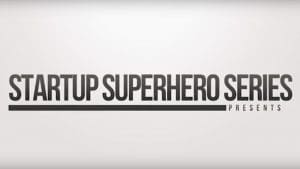 Stubbs Alderton & Markiles and the Preccelerator Program are proud to announce the launch of their Startup Superhero Video Series - featuring SA&M Attorneys, Preccelerator Mentors, and entrepreneurs on topics specific to entrepreneurship and lessons learned throughout the journey.
Stubbs Alderton & Markiles and the Preccelerator Program are proud to announce the launch of their Startup Superhero Video Series - featuring SA&M Attorneys, Preccelerator Mentors, and entrepreneurs on topics specific to entrepreneurship and lessons learned throughout the journey.
This week we're featuring Preccelerator Mentor Lisa Tsou as she talks about "Fundraising Tactics."
Lisa Tsou provides independent strategy and solutions for entrepreneurs so they can grow their businesses to the next level. She is passionate about working with innovative entrepreneurs and startups to develop unique strategies to grow and fund their businesses. Whether you are a startup on the track for traditional venture-capital financing or an entrepreneur on a more offbeat path, she can collaborate with you to develop and implement a creative and practical strategy for success. Lisa also speaks regularly on issues related to startups, tech and women in business. She has been a featured speaker at events including The West Hollywood Women’s Leadership Conference, The SoGal Summit, The USC Graduate Women in Business Summit, Women Founders Network, and Bruin Entrepreneurs, and appeared in publications including The Huffington Post, CNBC, GenHERation and E The Magazine for Today’s Female Executive and the Business Rockstars program.
__________________________
Transcript
Speaker: Lisa Tsou
Moderator: Heidi Hubbeling
Startup Superhero Series-Intro with Lisa Tsou "Fundraising Tactics"
Heidi: Today we are featuring Lisa Tsou of the Winning Pitch and Lisa is one of our mentors here at the Preccelerator. She specializes in fundraising, pitch-investor decks, helping companies with their formal presentation as well as other kinds of strategies for fundraising. Tell us a little bit about yourself and thank you for being here.
Lisa: Thanks Heidi. I started working with startups back twenty years ago this year, when I graduated from law school. Spent many years on Wall Street doing Venture Capital, Ipos, mergers and acquisitions, all with tech and startup companies. Spent my whole career on startups and am now concentrating on the part I really enjoy which is the growth part of startups. Working with startups on their fundraising, their investor strategy and positioning for investors.
Heidi: All very important things, especially at this stage within the Preccelerator and other startup companies in this Los Angeles ecosystem. Going back to the fundraising and preparing the pitch presentation, what exactly are investors looking for when companies are starting that fundraising process?
Lisa: I think the best way to think about what investors are looking for is to think of it as a risk reward ratio. Basically, venture capitalists are looking for a really big reward and as small a risk as possible. They’re looking for things with really big markets or things a consumer or a business would be using with a lot of frequency. Something that can get really big and then they are trying to find things with as little risk with the really big as possible. Things that would be considered as something like a risk would be does your product work? Does the consumer like it? Things like what other competition might be out there? I like to think of it as that kind of ratio.
Heidi: That’s a great way to look at it. In a life-cycle of a company, especially with these early stage companies When is the right time to start fundraising? What are those key metrics?
Lisa: I’m going to say something that I know is going to sound really contradictory, but it’s a combination of as late as possible and earlier than you think. A lot of startups go “oh I should go out there and find a venture capitalist to fund me” without thinking through when do they really need the capital? Can they go a little longer? The longer you can go without outside financing, the stronger position you’re in. If you go very early, the venture capitalist is going to take a lot of your company control and you are not going to get as much capital as you would like. So, on one hand think as late as possible on the other hand, from that point start earlier than you think. It’s going to take longer to get in front of investors, get them comfortable with you and build that relationship. From that point when you think you need capital, I would say start certainly start six to nine months earlier than that.
Heidi: The due diligence process by itself once you actually have somebody who is interested in funding you can take four, six, eight months at that point. Also, figuring out whether or not venture capital funding is right for you, versus angel investors versus small business loans. Whatever funding that type of company might need depending on their scalability.
Lisa: Absolutely! Investors are going to ask questions and you may need to think things through or vet some other elements of your business before they will write a check.
Heidi: What are your tactics? What do you suggest to startups when they start looking for funding? How can they get in front of an investor or a VC?
Lisa: It’s a combination of research and somehow wrangling a warm introduction. The research part being finding the right VC or investor depending on their situation. That makes sense for them. How big a check the investor generally writes and the industries they may be comfortable with investing in. Doing that research which will take time and then wrangling your warm introduction to get to them. A lot of investors are not going to be receptive just cold email or blind submissions to them. Working your way through your network, which may be a five or six step process to finding the person who knows a person, who knows a person, who knows a person, to getting in-front of that investor.
Heidi: That’s very important. So, you have been a value and a resource to the Preccelerator program. What are some of your favorite things about being a mentor here, about the program and working with the companies?
Lisa: I really enjoy working with the Preccelerator. As I said I was an attorney at one point doing this kind of work. It’s fun being around really smart people like at Stubbs Alderton and the other mentors who are also awesome. I just love working with the companies. I think you put together a really smart batch of companies who are doing a lot of interesting things in different industries. It’s always fun to come over here and hangout for a couple of hours and see what they’re doing and see if I can help them.
Heidi: I am proud of them! It was great to have you here and we will see you guys next time at the Startup Superhero Series.
_____________________
To learn more about the Preccelerator Program, contact Heidi Hubbeling at .
